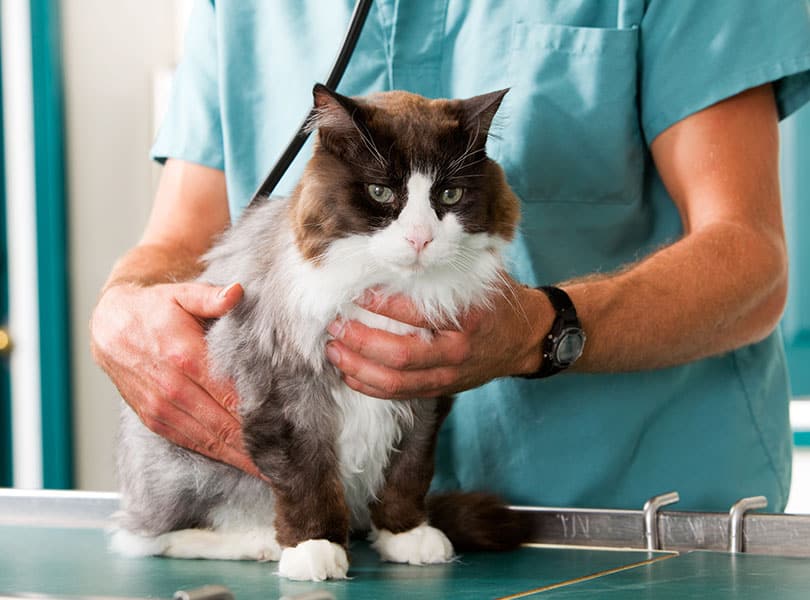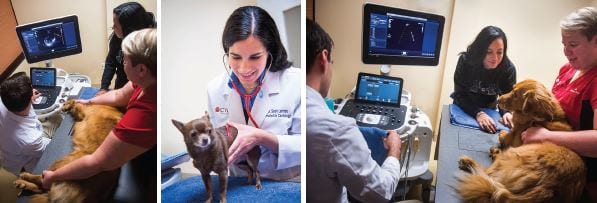Exploring the Differences Between CT Scans For Dogs and CT Scans For Animals}
Checking Out the Vital Providers Used by a Vet Cardiologist: Comprehending Ultrasound and CT Scan Methods
Veterinary cardiologists play a vital duty in the wellness of family pets by identifying and treating numerous heart problems. They use sophisticated imaging techniques, such as heart ultrasound and CT scans, to supply precise assessments. Each method has its distinctive advantages and applications. Understanding these strategies is necessary for family pet owners seeking the most effective take care of their companions. What variables should family pet owners take into consideration when selecting between these analysis tools?

The Duty of Vet Cardiologists in Pet Healthcare
Veterinary cardiologists play an essential function in the medical care of pets, focusing specifically on identifying and dealing with heart-related problems. They have specialized training that enables them to analyze intricate analysis examinations and recognize numerous cardio concerns. These specialists make use of sophisticated strategies, such as echocardiography and electrocardiography, to assess heart function and structure accurately.Veterinary cardiologists additionally create customized therapy strategies that might include medicines, way of life modifications, and, in some cases, surgical interventions. Their knowledge reaches informing animal owners concerning heart health and wellness, stressing the relevance of normal examinations and early detection of possible troubles. Partnership with general veterinarians is vital, as it assures complete treatment for animals with suspected heart problems. By providing specialized services, vet cardiologists considerably improve the quality of life for pet dogs and supply satisfaction for their proprietors, strengthening the significance of heart health in total animal health.
Typical Cardiac Concerns in Animals
Common heart issues in pet dogs can considerably impact their wellness and high quality of life. Heart whisperings, different sorts of cardiomyopathy, and hereditary heart defects are amongst the most widespread problems that veterinarians encounter. Cancer Veterinary Near Me. Comprehending these issues is necessary for animal proprietors to guarantee prompt medical diagnosis and suitable therapy
Heart Murmurs in Pets
Although heart murmurs can be a resource of concern for animal proprietors, they are not always a sign of significant health problems. A heart whispering is an unusual noise generated by turbulent blood flow within the heart. In family pets, these whisperings can be triggered by different aspects, consisting of congenital heart problems, valve problems, or perhaps stress during evaluations. Lots of pet dogs with heart murmurs lead normal lives without significant health and wellness effects. To figure out the underlying reason, vet cardiologists frequently employ diagnostic methods such as echocardiograms and Doppler ultrasounds. Early detection and evaluation are necessary, as they might aid take care of any kind of possible heart concerns successfully. Animal proprietors are urged to consult their vet for a comprehensive examination if a heart murmur is discovered.
Cardiomyopathy Kind Explained
Cardiomyopathy includes a group of diseases affecting the heart muscle, leading to compromised heart feature in pet dogs. The most typical types include dilated cardiomyopathy (DCM), hypertrophic cardiomyopathy (HCM), and limiting cardiomyopathy (RCM) DCM largely impacts canines, causing the heart to enlarge and weaken, which reduces its capability to pump blood efficiently. In contrast, HCM is extra common in cats, identified by the enlarging of the heart walls, frequently resulting in blocked blood flow. RCM, though less typical, happens when the heart muscle comes to be stiff, restricting its capability to full of blood. Each kind provides unique obstacles in diagnosis and therapy, requiring specialized veterinary cardiological examination to guarantee peak monitoring and look after influenced family pets.
Congenital Heart Flaws
Congenital heart issues represent a substantial classification of heart problems in pet dogs, unique from gotten conditions such as cardiomyopathy - CT Scans For Animals. These defects are architectural abnormalities present at birth, influencing the heart's normal feature. Common types consist of patent ductus arteriosus, ventricular septal flaws, and pulmonic constriction. Signs might vary commonly, varying from light to serious, and can consist of exercise intolerance, coughing, and problem breathing. Early medical diagnosis through sophisticated imaging strategies like ultrasound is important for efficient monitoring. Veterinary cardiologists play an essential duty in identifying these conditions and advising appropriate treatment choices, which might consist of medical administration or medical treatment. Recognizing hereditary heart flaws permits for better results and improved top quality of life for affected animals
Comprehending Heart Ultrasound: Just How It Functions
A substantial variety of veterinary practices now utilize cardiac ultrasound as a vital analysis device for evaluating heart health and wellness in animals. This non-invasive method utilizes high-frequency sound waves to produce pictures of the heart's structure and function. During the procedure, a veterinary technician applies a gel to the animal's upper click body and makes use of a transducer to produce ultrasound waves. These waves bounce off the heart and surrounding frameworks, creating real-time photos on a monitor.Veterinarians can analyze numerous elements of cardiac health, consisting of chamber dimension, wall surface movement, and valve function. Additionally, heart ultrasound permits the discovery of irregularities such as fluid accumulation and genetic heart flaws. This method is important for diagnosing problems that might not show up through standard radiographs. By giving thorough info about the heart's composition and performance, heart ultrasound aids in formulating reliable treatment prepare for pets dealing with heart disease.
The Importance of CT Checks in Identifying Heart Conditions
Just how do CT scans improve the diagnosis of heart problems in veterinary medication? CT scans supply comprehensive cross-sectional photos of the heart and surrounding frameworks, enabling veterinarians to picture complex physiological connections. This imaging strategy is especially advantageous in recognizing congenital heart issues, cardiac lumps, and irregularities in capillary. By utilizing innovative imaging algorithms, CT scans can examine heart chamber sizes and feature, offering a detailed view that may be challenging to attain with conventional methods.Additionally, CT angiography can envision blood flow and determine locations of stenosis or blockage, which is essential for preparing possible interventions. The speed and accuracy of CT scans additionally help with fast medical diagnoses, important in emergency situation scenarios. Ultimately, the consolidation of CT checks right into veterinary cardiology significantly boosts the precision of diagnoses, allowing targeted treatment strategies and boosting patient results for animals struggling with heart problems.
Comparing Ultrasound and CT Scan Methods
While both ultrasound and CT scans are very useful devices in veterinary cardiology, they provide unique advantages and restrictions that affect their usage in detecting heart problems. Ultrasound, or echocardiography, provides real-time imaging of the heart's structure and feature, allowing veterinarians to examine heart chambers, shutoffs, and blood circulation. It is especially effective for examining problems like congestive heart failing and cardiomyopathy. However, ultrasound may be restricted in visualizing certain anatomical structures due to patient size or obesity.In comparison, CT checks offer thorough cross-sectional photos of the heart and bordering cells, making them excellent for recognizing architectural problems, growths, or vascular problems. Although CT scans offer extensive insights, they call for sedation and might include radiation exposure. Eventually, the choice in between ultrasound and CT checks depends upon the specific clinical scenario, the person's problem, and the info needed for an accurate medical diagnosis.
Treatment Options Available Via Veterinary Cardiology
Veterinary cardiology supplies an array of treatment options customized to attend to various heart conditions in pets. Therapy strategies usually begin with lifestyle modifications, including diet regimen changes and workout adjustments, focused on improving general heart wellness. Medicines play an essential function, with cardiologists suggesting drugs such as diuretics, beta-blockers, and ACE preventions to enhance and handle signs and symptoms cardiac function.In a lot more extreme cases, interventional treatments, such as balloon valvuloplasty or stent positioning, may be required to relieve blockages or enhance blood circulation. For sure congenital heart flaws, medical options may be checked out to deal with structural problems. In addition, recurring monitoring and follow-up care are necessary components of a complete therapy plan, allowing for timely modifications based upon the pet dog's response to therapy. In general, vet cardiology concentrates on providing effective, personalized like enhance the click here for more wellness and health of pet people with heart conditions.
Exactly how to Prepare Your Family Pet for a Heart Evaluation
Preparing an animal for a cardiac evaluation is important to ensure precise results and a smooth process. Owners should initially schedule the appointment with the vet cardiologist and discuss any kind of details needs or problems. It is recommended to withhold food for at least 12 hours prior to the analysis, as this aids improve imaging high quality during visit this website procedures like ultrasound or CT scans.Additionally, keeping a tranquil atmosphere on the day of the visit can help in reducing the pet dog's anxiety. It is advantageous to bring along any pertinent clinical records, including previous examinations and medicines (Board Certified Veterinary Cardiologist). Owners need to likewise make sure that their pet is comfy and leashed during transport to the facility. Lastly, familiarizing themselves with the analysis procedure can ease concerns and aid in asking educated concerns throughout the examination. By complying with these steps, owners can contribute substantially to the efficiency of the heart analysis
Frequently Asked Inquiries
How much time Does a Heart Ultrasound or CT Scan Take?
The period of a heart ultrasound usually varies from 30 to 60 minutes, while a CT scan might take approximately 15 to half an hour. Aspects such as the patient's condition can affect these time estimates.

Are There Any Dangers Related To These Diagnostic Procedures?

Can I Keep With My Animal Throughout the Procedure?
The veterinary facility's plan typically determines whether pet proprietors can continue to be during procedures. While some clinics urge proprietor visibility for convenience, others might call for splitting up to guarantee safety and ideal problems for analysis imaging.
Just how much Do These Analysis Tests Typically Cost?
The prices of analysis tests, such as ultrasound and CT scans, usually vary based on place and facility. Typically, costs range from a couple of hundred to over a thousand dollars, mirroring the complexity and technology included.
What Is the Recovery Refine After a Cardiac Analysis?
The healing procedure after a cardiac analysis includes monitoring the family pet for any prompt reactions, making certain comfort, and restricting physical activity. Vets typically give post-evaluation instructions to lead pet proprietors throughout this vital recuperation period. Heart whisperings, various types of cardiomyopathy, and genetic heart problems are amongst the most prevalent problems that veterinarians experience. A heart whispering is an abnormal noise generated by rough blood circulation within the heart. Cardiomyopathy encompasses a group of conditions affecting the heart muscle mass, leading to endangered cardiac function in family pets. Genetic heart problems stand for a substantial category of heart concerns in pets, unique from gotten conditions such as cardiomyopathy. Ultrasound, or echocardiography, gives real-time imaging of the heart's structure and function, enabling vets to analyze heart chambers, shutoffs, and blood circulation.